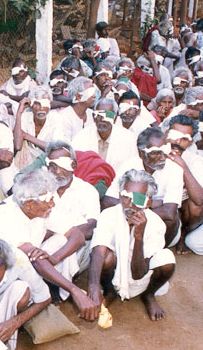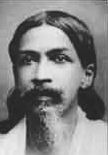|
|
  iMahal Interview Series:
iMahal Interview Series:
G. Venkataswamy
June 17, 2001
 iMahal:
You were a Professor of Ophthalmology between 1956 and 1976 in Madurai. That was a
career in itself. But your continued; you pioneered the concept of eye camps and safe
assembly-line techniques for eye care. How did this all come about?
iMahal:
You were a Professor of Ophthalmology between 1956 and 1976 in Madurai. That was a
career in itself. But your continued; you pioneered the concept of eye camps and safe
assembly-line techniques for eye care. How did this all come about?
 Venkataswamy:
Initially the State Government gave us a mobile unit to conduct eye camps to help the
blind people in rural communities. I saw hundreds of people blind due to cataract. I
realized that, with a simple operation, their sight could be restored. It was a simple
observation, and I simply decided that I should continue to help people with their sight.
As we did more and more of these eye camps, they became popular among the people
and we got a lot of community support. By 1998 we were conducting more than 1400 of
these camps each year, and improving sight for millions of people. I was fortunate to
have had the opportunity to build a good eye hospital in the private sector.
Venkataswamy:
Initially the State Government gave us a mobile unit to conduct eye camps to help the
blind people in rural communities. I saw hundreds of people blind due to cataract. I
realized that, with a simple operation, their sight could be restored. It was a simple
observation, and I simply decided that I should continue to help people with their sight.
As we did more and more of these eye camps, they became popular among the people
and we got a lot of community support. By 1998 we were conducting more than 1400 of
these camps each year, and improving sight for millions of people. I was fortunate to
have had the opportunity to build a good eye hospital in the private sector.
 iMahal:
You did not name your hospitals after yourself. They are all named Aravind, which is the
Sanskrit word for lotus (aravinda). The Bengali pronunciation of the word is Aurobindo,
which is the name of a spiritual leader who lived between 1872 and 1950. Could you
describe your relation to this guru?
iMahal:
You did not name your hospitals after yourself. They are all named Aravind, which is the
Sanskrit word for lotus (aravinda). The Bengali pronunciation of the word is Aurobindo,
which is the name of a spiritual leader who lived between 1872 and 1950. Could you
describe your relation to this guru?


|
|
Aurobindo
|
Venkataswamy:
In April of 1950, a Gandhi-ite friend of mine said, "Let's go to the ashram in Pondicherry
and have the darshan (sacred sight) of Sri Aurobindo." It was my first darshan of the
great master, who passed away that year in December. People were able to see him once
every three months, and there was usually a big crowd, about two thousand people. You
marched in a line, you saw him for a second, and then you marched off. That day in April
he did not make any sort of impact on me worth remembering. I had made many friends
at the ashram and gradually, over the years, I read Sri Aurobindo's books and became
involved in his teachings. I have immense faith in Sri Aurobindo's teaching that man can
evolve to a higher level of consciousness and have great capacity for good work. Many
members of our hospital staff go to the Aurobindo ashram. We feel that the higher
consciousness is trying gradually to give us a system. We are all aware of the parts of the
human body as they work. We take in food; we like the taste of it. Part of it is absorbed
here, part of it there. But we are not aware of it. The higher consciousness works in the
same way. Slowly, your system is built around it, but not according to human nature. At
the hospital, we are slowly building an organization that seems to be linked with the
higher consciousness.

 

|
 |



